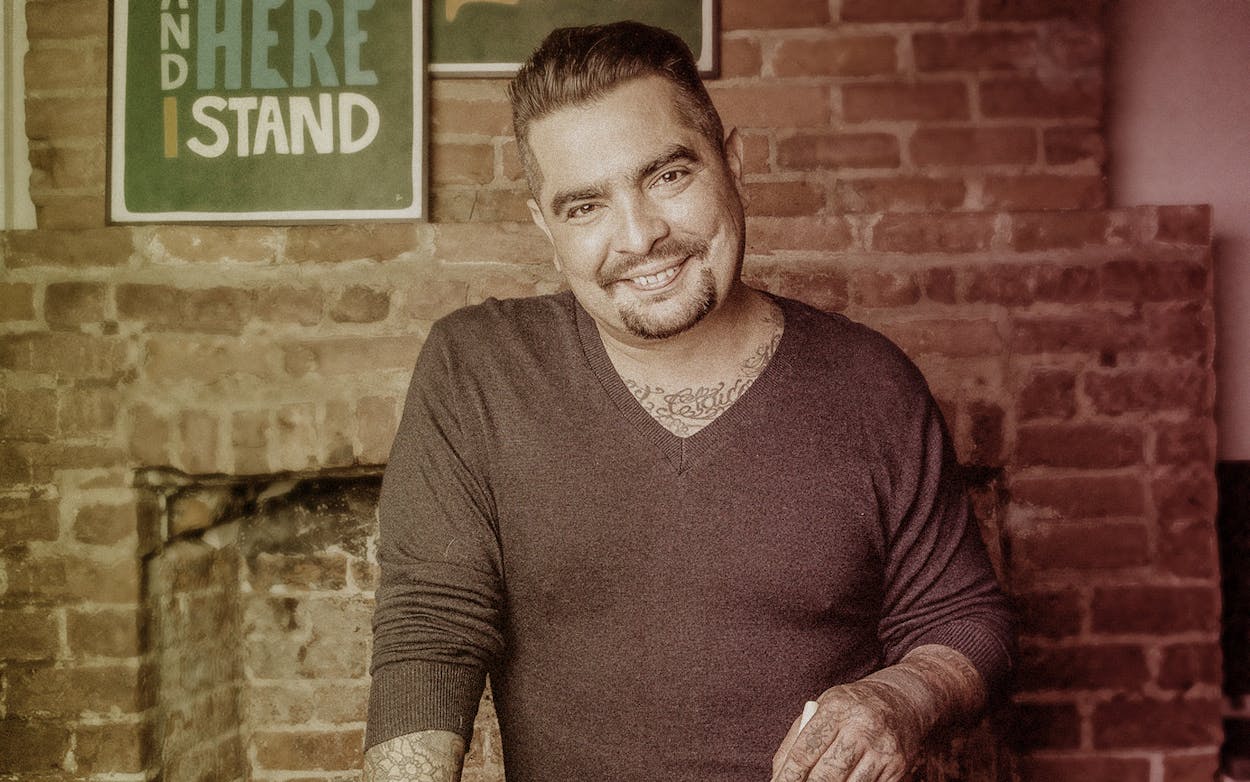Subscribe
Chef Aarón Sánchez believes the restaurant industry is headed for a reckoning.
“Customers are more focused and more informed than they’ve ever been about where their food comes from, how it’s prepared, and what its influences are,” says Sánchez, the El Paso native behind the award-winning Mexican restaurant Johnny Sánchez in New Orleans. “If you’re not really up to your game right now, you’re going to be weeded out and, sadly, you’re going to see a lot of very iconic restaurants and chefs that have been doing it for many years fall by the wayside because they’re not evolving and they’re not understanding how this new generation is a lot more stringent and a lot more particular about how they want to eat.”
The future of the restaurant business—more specifically the need to balance tradition and innovation within Mexican cuisine—figures prominently in Sánchez’s new memoir, Where I Come From: Life Lessons From a Latino Chef. The book details a childhood spent shuttling between El Paso and New York City. His mother, Zarela Martinez, ran Zarela, a restaurant widely credited as a pioneer in bringing regional Mexican cuisine to NYC. The issue of representation in restaurant kitchens, ownership groups, and on television is important to Sánchez. He serves as a judge on Fox’s MasterChef and MasterChef Junior, and he runs the Aaron Sánchez Scholarship Fund to assist aspiring Latino chefs in attending culinary school.
On this week’s National Podcast of Texas, Sánchez surveys the challenges arrayed against young chefs trying to strike out on their own, outlines the evolution of televised food shows, and weighs in on the debate about whether burritos are tacos.
Three takeaways from our conversation:
1. Sánchez designed his memoir to be an inspirational, but also cautionary, tale. He believes the restaurant industry attracts a disproportionate share of obsessive and addictive personalities, and he purposefully didn’t shy away from detailing his own battles with addiction and depression.
“In my time, when we were coming up, it was a free-for-all. We would roll hard. I’d worked three doubles in a row to get two days off kind of thing. And we’d go out, party after work, and sometimes party at work. At times it got excessive, and everyone tried to find that edge. They say that sometimes being a chef is a young man or young woman’s game. And in those days it definitely was, because I can never imagine myself, even for a moment, thinking like that anymore. People were also less open about anxiety and depression at that point. And for me, I didn’t understand it. I just remember every day that I would finish work, I didn’t feel satisfied. I felt like something was missing. I could never get comfortable in my own skin. And I always felt like something was pending—like some doom was about to come on top of me—and I didn’t understand that. And I thought that’s what depression is. And when I was able to face that head on and get the counseling and the medicine necessary, everything changed. There was a huge shift that let me take on more and understand that the world was a lot bigger and I can make an impact.”
2. Sánchez believes Anthony Bourdain forever changed how we talk about the food industry and how much diners are interested in what happens behind the scenes.
“In 1999, he’d written an anonymous article for the New Yorker called ‘Don’t Eat Before Reading This.’ He spilled the beans on the restaurant industry. I used to shop and buy fish at this place called Wild Edibles on Elizabeth Street in SoHo in New York, and I remember coming in there on a Saturday morning early to buy fish for my restaurant. And I was talking to the fishmonger, and I said, ‘Do you believe this person? Whoever wrote this article must be a huge asshole. He’s a Custer! A traitor!’ And then Tony tapped me on the back of the shoulder. He says, ‘I’m that guy.’ And from there we struck up a really great friendship that lasted for many years because in that moment he didn’t have to own that. He was enamored and entranced by the idea of the kitchen renegade and the pirate culture that permeates kitchens. And I just found him amazing to be around.”
3. Sánchez’s foundation is built to address what’s traditionally been a lack of opportunity for Latinos in attaining positions of authority and executive positions in kitchens.
“Sadly, I remember a chef telling me that being a cook is the best thing I’m going to get. And I said, ‘Okay asshole, just teach me how to make the terrine, and I’ll do it better than you.’ And so that’s kinda how the process started for me in my evolution. And now it’s so commonplace to see the Latino force in kitchens really excelling and being hugely successful. But I also think about how a lot of my colleagues are Anglos opening Mexican restaurants because they’ve gone and been inspired by Mexico. But if I were to open a French restaurant or a Thai restaurant, I’d be criticized because maybe there’s a notion that I couldn’t know the food intimately enough. That’s a double standard. And then couple that with who’s cooking in those French and Italian restaurants? Mexicans and Latinos, doing their thing. We’re living in interesting times, you know?”






